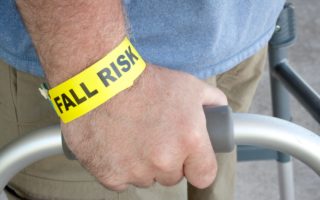Dangers of a Broken Hip in Seniors
A broken hip can be one of the most devastating injuries for an elderly adult. The older they are, the more at risk they are of sustaining a hip fracture. While breaking a bone at any age is traumatic and difficult to recover from, a hip fracture at an advanced age can lead to lots of new health problems. Family caregivers that worry about their elderly loved one breaking their hip need to do everything they can to prevent the injury. If it does happen, they can play a big role in the quality of the recovery.

Home Care Seattle WA – Dangers of a Broken Hip in Seniors
Why Are Seniors at High Risk for Hip Fractures?
There are a number of reasons why seniors have such a high risk of hip fractures. Primarily, bones become weaker with age and may be affected by diseases such as osteoporosis. These brittle bones are more likely to break during a fall or other impact such as a car crash. In some cases, seniors can suffer from fractures just by twisting the wrong way. The weak bones also take longer to heal, prolonging the recovery process for the elderly.
Aging adults are also more likely to get into situations where they slip and fall, causing the broken hip. Poor vision, decreased muscle mass, dizziness and balance issues, slow reflexes and more can all lead to situations where a senior can break their hip. Even standing up too quickly with high blood pressure can lead to a fall that results in a broken hip.
Health Problems When Treating a Broken Hip in Seniors
Surgery is the only way to repair a broken hip. The medical team will usually use pins or plates to re-align the bones and keep them in their proper place. The recovery from the surgery and the break is long and painful. Some seniors never fully recover from the break and the surgery. Studies even show that a broken hip is one of the top reasons why some elderly adults finally move to a long-term care facility.
Elderly adults need a good support system in place to help them with basic daily tasks. Options include family members, friends and neighbors, home care assistants, community senior services and of course the family caregiver. A broken hip will significantly impact an elderly person’s independence .
One of the reasons why a broken hip is so dangerous for seniors is because there are numerous complications that arise due to the injury itself as well as the long recovery time. Complications include urinary tract infections, bed sores, blood clots in the lungs or legs, loss of muscle mass and pneumonia. Having a weakened condition post-surgery also increases an elderly person’s risk of falling again and re-injuring the hip or creating a new break. Many seniors require family caregiving and home care services for the rest of their life due to the lifestyle changes the injury creates.
It’s never too late for seniors to incorporate healthy habits that may build more bone and muscle mass and reduce the risk of breaking a hip. Family caregivers can do their part in making sure their elderly loved one gets exercise, a healthy diet, vision checks and uses a walker or cane if they are not steady on their feet. Caregivers should definitely do what they can to help their elderly relative avoid a broken hip.
Source: http://www.mdedge.com/jfponline/article/77278/geriatrics/hip-fracture-older-patients-tips-and-tools-speed-recovery
If you or an aging loved one are considering Home Care Services in Seattle WA, contact the caring staff at Hospitality Home Care today. Call us at (206) 966-6552.
- Is Chocolate a Healthy Valentine’s Day Treat? - February 1, 2018
- Preventing Hip Fractures in Elders - January 24, 2018
- Ways to Work Out When It’s Too Cold to Go Outside - January 18, 2018